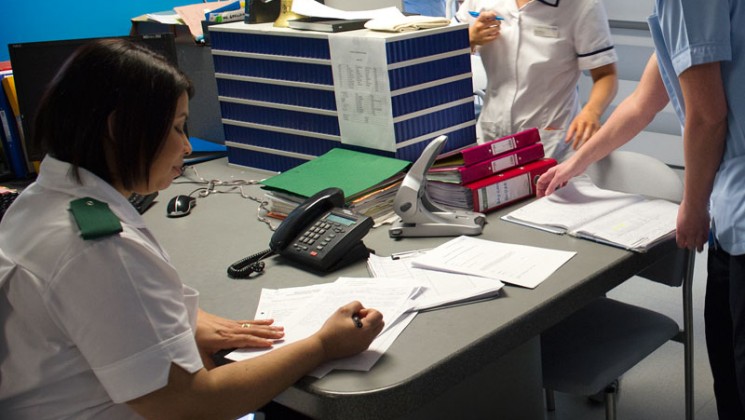News
We need to ‘mobilise for war’ says head of British Army – ‘this is our 1937 moment’

THE NEW head of the British Army has said it must ‘mobilise’ in response to the threat posed by Russia’s invasion of Ukraine, invoking memories the Allies’ struggle against Nazi Germany in the 1940’s.
Patrick Sanders, a general who became the army’s top officer this month, said Moscow’s attack on its neighbor represented “a clear and present danger” to Western “principles of sovereignty and democracy.”
In a wide-ranging speech to mark taking over the role, he argued Britain’s armed forces must react by accelerating modernization plans and immediately increasing battle readiness alongside NATO allies.
“This is our 1937 moment,” Sanders told an audience at the Royal United Services Institute (RUSI) military think-tank, referring to Western allies’’ struggle to subdue Nazi Germany’s aggression in the run-up to World War II.
“We’re not at war. We must act rapidly so that we aren’t drawn into one through a failure to contain territorial expansion.”
Adding it is “dangerous” to assume Russian aggression will end with Ukraine, he predicted Moscow will pose “an even greater threat to European security after Ukraine than it has before.”
“The Russian invasion has reminded us of that time-honored maxim that if you want to avert conflict, you better be prepared to fight,” Sanders said.
His comments come as NATO members begin to meet in Madrid Tuesday for a summit, and follow the military alliance announcing it will boost its high-readiness force from 40,000 to 300,000 troops.
Its chief Jens Stoltenberg has called the move “the biggest overhaul of our collective defense and deterrence since the Cold War.”
Sanders said the gathering in the Spanish capital was an opportunity for Britain to demonstrate its “enduring commitment to our allies” and “lead by example” in mobilizing the army.
He noted mobilisation would now be the army’s “main effort” over the coming years, “to help prevent war in Europe by being ready to fight and win alongside our NATO allies.”
“It will be hard work, a generational effort and I expect all ranks to get ready, train hard and engage,” he added.
The army head also backed the US and UK governments’ stance of aggressively arming Ukraine in its fight against Russia.
“This is the moment to defend the democratic values that define us,” Sanders said.
“This is the moment to help our brave Ukrainian allies in their gallant struggle. This is the moment we stand with our friends and partners to maintain peace throughout the rest of Europe.”
Health
Nurses warn of pay and burnout crisis as new report exposes pressures in Wales

A NEW national report has laid bare the growing pressures facing nurses and midwives in Wales, with concerns over pay, burnout and lack of professional development threatening the long-term future of the workforce.
The findings, published by the Nursing and Midwifery Council in its Spotlight on Nursing and Midwifery 2025 report, show that while many nurses remain deeply committed to their roles, large numbers feel undervalued, overstretched and reluctant to recommend the profession to others.
Responding to the report, Royal College of Nursing Wales said the data should act as a wake-up call for government and health boards.
Professor Sandy Harding, Associate Director of Nursing, Policy and Professional Development at RCN Wales, said:
“We welcome the determination and commitment shown by our existing nurses in Wales, with more than half surveyed saying they are satisfied with their day-to-day work and motivated by making a difference to people’s lives. However, the findings also present a stark reflection of the poor health of nursing in Wales.
“Too many nurses are not recommending the profession to others, are struggling and are facing abuse and discrimination in the workplace.”
Pay falling behind responsibility
One of the most pressing concerns raised in the report is pay.
Nursing leaders say salaries have failed to keep pace with the growing complexity of the job, heavier caseloads and the rising cost of living, leaving many staff feeling undervalued and financially squeezed.
For some, the pressure is forcing difficult decisions about staying in the profession or reducing hours.
RCN Wales argues that without meaningful improvements to pay, recruitment and retention will continue to suffer, placing further strain on already stretched hospital wards, community services and care settings.
Training and career progression gaps
The report also highlights inconsistent access to continuing professional development, with many nurses struggling to secure protected time or funding for further training.
According to the union, this not only limits career progression but risks undermining patient care in the long term.
Harding said: “Access to protected time and funding for continuing professional development remains inconsistent, undermining both career progression and the sustainability of the workforce.
“RCN Wales believes this is unacceptable and we will continue to support nurses and fight for fair pay, meaningful investment in professional development and better working conditions across Wales.”
Commitment remains strong
Despite the challenges, the report does note strong dedication among nursing staff.
More than half of those surveyed said they were satisfied with their day-to-day work and remained motivated by the difference they make to patients’ lives.
Health leaders say that commitment is a strength the NHS in Wales cannot afford to lose.
With around 35,000 members in Wales, the Royal College of Nursing says it will continue pressing ministers to address what it describes as a “workforce crisis” before it deepens further.
The union is calling for fairer pay settlements, safer staffing levels and guaranteed investment in training to ensure nursing remains an attractive and sustainable career.
Local Government
Pension fund divestment debate set for March 5

Gaza-linked petition to be discussed by councillors with no officer report planned
A PETITION calling for Pembrokeshire’s public sector pension fund to divest from companies linked to Israel will be debated by councillors next month.
The proposal has been scheduled for discussion at a meeting of Pembrokeshire County Council’s Full Council on Wednesday (Mar 5).
More than 500 people signed the e-petition, triggering a formal debate under the council’s petitions scheme.
Campaigners are asking the authority to press the Dyfed Pension Fund to withdraw investments from firms alleged to be “complicit with Israel’s genocide of Gaza”, arguing that public money should not be invested in businesses connected to conflict or alleged human rights abuses.
However, critics say foreign policy matters fall outside local government’s remit and warn that divestment could reduce investment flexibility or affect long-term returns for pension holders.
Sharon Ross, a freelance writer who contacted The Herald ahead of the debate, said councils should prioritise local services.
She said: “Local issues where councillors can make a real difference – roads, schools and healthcare – risk being pushed aside for international politics.
“Excluding an entire country from investment portfolios could reduce diversification and potentially lower returns without achieving meaningful change overseas.”
Council pension schemes operate under fiduciary duties requiring investments to act in the best financial interests of members.
The council has confirmed the item will go directly to Full Council for debate and that no officer report will accompany the discussion.
Agendas are expected to be published on the council’s website in the week before the meeting.
Community
Murals legacy honoured at Town Hall

Artist Jeanne Lewis recognised as Pembroke celebrates 20 years of historic artwork
MRS JEANNE LEWIS and her daughter were guests of honour at a special presentation at Pembroke Town Hall on Tuesday to mark the 20th anniversary of the historic murals installed inside the building.
Two handcrafted benches, gifted by Pembroke Town Council, were presented in appreciation of the artwork created by Jeanne and her late husband, George Lewis, whose striking panels have become a defining feature of the Hall over the past two decades.
The murals, which vividly depict scenes from Pembroke’s past, have long drawn praise from residents and visitors alike for their scale, colour and intricate storytelling.
The Mayor of Pembroke, Gareth Jones, joined councillors and volunteers from Pembroke Museum to present Mrs Lewis with a Certificate of Appreciation and a bouquet of flowers in recognition of the couple’s lasting artistic legacy.
Councillor Jones said the town was “extremely fortunate and deeply privileged” to house the collection.

He added: “People often walk into the Town Hall and simply stop to look. The detail and the history captured in these murals are remarkable. They give visitors a real sense of Pembroke’s story and reflect the dedication and talent Jeanne and George brought to the project.”
Twenty years on, the artwork continues to enrich the civic building, ensuring the Lewis family’s contribution remains at the heart of the town’s heritage.
Photo caption: Jeanne Lewis receives a certificate from Mayor Gareth Jones at Pembroke Town Hall, marking 20 years since the installation of the town’s historic murals (Pic: Martin Cavaney/Herald).
-

 Health6 days ago
Health6 days agoConsultation reveals lack of public trust in health board
-

 Community7 days ago
Community7 days agoPembrokeshire students speak at national Holocaust Memorial Day event
-

 News1 day ago
News1 day agoPrincess of Wales visits historic Pembrokeshire woollen mill
-

 Crime5 days ago
Crime5 days agoPembroke man accused of child sex offences sent to Swansea Crown Court
-

 Education7 days ago
Education7 days agoAttendance concerns at Milford School reflect wider issue raised at the Senedd
-

 Education7 days ago
Education7 days ago‘Vulnerable teen’ questioned by police at Milford Haven School
-

 Community6 days ago
Community6 days agoCampaign to ‘save’ River Cleddau hits over 2,200 signatures
-

 Health3 days ago
Health3 days agoDoctor struck off after sexual misconduct findings at Withybush Hospital

























